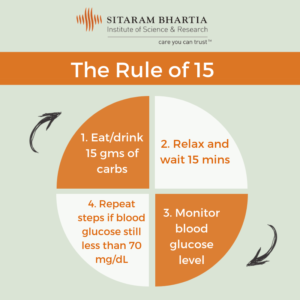Hypoglycemia, a condition where the body experiences low blood sugar levels, is often a great cause of concern for people diagnosed with diabetes. Symptoms associated with low blood sugar can greatly impact your day-to-day life, which makes management of hypoglycemia a commonly addressed topic during routine checkups.
Dr. Silviya Irene, Consultant Endocrinologist at our Diabetes Center, Sitaram Bhartia Hospital (South Delhi), found herself addressing similar doubts at her consultation with a patient one day. A 28-year-old investment banker, Rashi Mathur, was a patient of type-2 diabetes and on medications. She had recently noticed that she would often experience classic symptoms of hypoglycemia such as palpitations, cold sweats, etc.
“I grew concerned as the episodes had been occurring more frequently than usual, and I approached Dr. Silviya for advice,” recalls Rashi. She put forth her queries immediately.
What is hypoglycemia?
“Although your blood glucose levels can vary throughout the day, certain factors can cause them to reduce significantly. This dip in the levels, usually recorded below 70 mg/dl, is called hypoglycemia. It can be dangerous for you if it is not treated appropriately and on time,” cautioned Dr. Silviya.
“What is the first sign of hypoglycemia?” asked Rashi, hoping to recognise her hypoglycemia symptoms on time hereon.
“Our body’s initial response to low blood sugar levels is to stimulate the adrenaline hormone (adrenergic system) secretion, also known as the fright hormone. You may experience your body’s reaction to the excess adrenaline in the form of symptoms such as:
- Palpitations or irregular heartbeats
- Tremors
- Sweats
- A tingling sensation in or around your mouth
However, the brain is incapable of tolerating reduced levels of blood sugar for long periods of time. This is why, if not treated promptly, your brain starts sending out warning signals such as:
- An increased sense of hunger or cravings
- Feeling cloudy
- Blurred vision
- Dizziness or light-headedness
- Blackouts or loss of consciousness
- Seizures
- Coma
Please note that these symptoms can vary from person-to-person. As your brain is deprived of blood glucose, the symptoms gradually worsen as well until management of hypoglycemia is carried out on time.
What causes hypoglycemia?
Upon further questioning, it was discovered that Rashi’s demanding work schedule would often force her to skip her meals. She did take her medication as per her treatment plan, however, which was the reason her glucose levels would oscillate so often.
Dr. Silviya urged Rashi to be more vigilant with her meals hereon. She discussed the common causes of hypoglycemia with her for her benefit:
- The main function of medication, either orals or injectables, is to regulate your blood glucose levels. This is why an inadvertent overdose of medicine often causes hypoglycemia amongst patients.
- A proper treatment plan is pre-determined by your doctor and customized to your body’s requirements. Any adjustments to be made to this plan should be discussed with them beforehand as any discrepancy in medication timings can adversely affect your blood sugars.
- Due to the fact that your medication is going to complete its function whether you eat or not, skipping or delaying meals can cause your blood sugars to reach a level lower than recommended.
- Strenuous exercise or unintended physical activity that is out of your usual daily routine
- Alcohol consumption
- Any reduction of carb content from your meals that is different from the usual
Why is management of hypoglycemia important?
Hypoglycemia can seriously affect your working capacity and reduce your performance or efficiency in your day-to-day life. Rashi came to realise that she was stuck in a vicious cycle of an unhealthy lifestyle that she needed to break.
“People who experience hypoglycemia persistently are often anxious about traveling or going to work for fear of getting low blood sugars at inconvenient moments. This fear can often have an effect on their day-to-day lives.”
Recurrent episodes of hypoglycemia can also contribute to worsening of associated comorbidities such as retinopathy.
Hypoglycemia Unawareness
If you have been undergoing frequent episodes of hypoglycemia for a long period of time, then your body will slowly get used to it. Your brain eventually stops emitting warning signals every time your blood sugars dip. This is called hypoglycemia unawareness and can prove dangerous.
“This can be avoided by taking proper steps to prevent episodes of hypoglycemia right from the beginning of the disease.”
There is no particular level at which every individual starts exhibiting symptoms of hypoglycemia as the body’s limits can vary from person to person. Rashi was encouraged to learn to recognize the signs her body gives out when her blood glucose levels fall.
How is hypoglycemia treated?
It is a commonly believed notion that regulating your blood sugar levels to remain within a certain limit is a herculean task but this misconception needs to be addressed!
Rashi was properly counseled on how to treat hypoglycemia at home in case of emergencies.
“Untreated hypoglycemia can be harmful and should be managed appropriately. If your blood sugars fall below 70 mg/dl, then follow the ‘rule of 15’.”

“Foods high in sugar content such as sugar, glucose tablets, or 1⁄2 a glass of fruit juice can be taken in order to treat hypoglycemia in a conscious patient.”
“If the person is, however, unconscious or not in a state to ingest sugar orally, then you will be advised to transport them to the Emergency Room (ER) immediately. They will be administered IV glucose or injected with IM glucose injections.”
Can hypoglycemia happen to patients who don’t have diabetes?
Uncommon causes of hypoglycemia that also require timely management can be caused due to the following factors:
- If you have been experiencing hypoglycemia recurrently, it might be time for you to rule out the possibility of underlying issues in your kidneys or liver and treat them before your symptoms worsen.
- Mistakenly ingesting diabetes medication not intended for you can also induce hypoglycemia.
- People who have undergone gastric bypass surgery (bariatric surgery) tend to have a reduced appetite and absorption as the food transits to the intestines faster, not leaving the body enough time to take in adequate amount of blood glucose.
- Abnormal pancreatic conditions where insulin secretions are produced at a higher rate than normal and cause your blood glucose levels to fall.
Rashi left the consultation after the in-depth discussion on living a disciplined lifestyle and regularly monitoring her glucose levels. She vowed to make healthier life choices and take better care of her diabetes condition.

